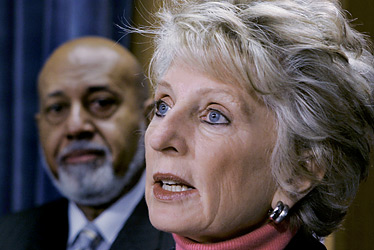Pakistan, an unfailing friend or failing state!
Washington , Jan. 23 : Evidence of Pakistan's looming disintegration is visible everywhere, and it would not be farfetched to say that 2007 was the year when Pakistan was lost to the world. and more specifically to the United States, says a member of the U. S. Congress.
, Jan. 23 : Evidence of Pakistan's looming disintegration is visible everywhere, and it would not be farfetched to say that 2007 was the year when Pakistan was lost to the world. and more specifically to the United States, says a member of the U. S. Congress.
According to Representative Jane Harman of California, who is the chairman of the Homeland Security Subcommittee on Intelligence and Terrorism Risk Assessment, Pakistan has become a cesspool of political instability and terrorism.
She cites various developments as being responsible for the present scenario in Pakistan.
Starting with President Pervez Musharraf failing to reach a settlement for peace with tribals to the sacking the Chief Justice of the Supreme Court in March, the Lal Masjid stand-off in July, the failed return of former Prime Minister Nawaz Sharif in September, Benazir Bhutto's return to Pakistan in October's return to Pakistan, the declaration of an emergency in November and Bhutto's assassination on December 27, Pakistan has been teetering from one crisis to the next, Harman claims in an article written by her.
"There is new fighting in the Swat valley, where Islamic extremists have gained a foothold, and now news that the Inter-Services Intelligence (ISI) Pakistan's leading military intelligence agency has lost control of its networks to al Qaeda sympathizers . We always suspected that ISI's networks had Taliban leanings, but this is the clearest evidence that Pakistan's extremists may be cannibalizing the country's security forces," she adds.
She believes that there is a need for the Bush Administration to watch the activities taking place in terrorist training camps in Western Pakistan, which is not only home to Osama bin Laden and al Qaeda's top leadership, it is where all of the major plots against European and Western targets were hatched, and Pakistan's nuclear program.
She says there is an absolute need to be aware of not only the locking down of weapons and facilities, but also have knowledge of the centrifuge technology, the bomb design that is unguarded etc.
There is also the question of why President Musharraf has never imprisoned A. Q. Khan, the architect of Pakistan's nuclear weapons program inspite of nailing him five years ago for his international proliferation activities.
According to Harman, the United States has given a blank cheque to Musharraf, sending him some 150 million dollars a month with next to no strings attached.
"He has taken this aid for granted and used it in ways that are not helpful in the fight against al Qaeda such as buying fighter jets to tweak and intimidate India," Harman opines.
Musharraf has also been calling the shots in the Federally Administrated Tribal Areas (FATA) along the Afghanistan-Pakistan border and America has not done enough to support moderate Islamic forces in Pakistan or elsewhere.
"The radicalization of Pakistan's youth mirrors a trend across the Islamic world. America has done precious little to arrest this trend," she emphatically says.
Perhaps there was a rationale for supporting Mr. Musharraf immediately after September 11. He offered to join the fight against radical jihadists and made early efforts to police the FATA. But then, to preserve his power, he backed off. Events at the end of 2007 have sorely tested the Musharraf first policy.
In 2008, therefore, America must explore ways to shift its approach to Pakistan and do more to support education and enterprise there, instead of focusing on maintaining Musharraf in power. (ANI)